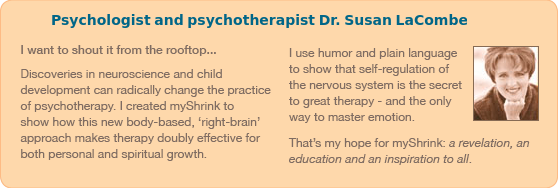What is the stress response?
When feeling uptight, is your everyday mood
Remember your last counseling session? Maybe you were talking about a difficult subject. And as you did so, you probably felt your stress response in action. In the brain, it was actually the sympathetic nervous system (SNS) that took over.
It's your SNS that's responsible for the tightness in your chest, the butterflies in your stomach, your shoulders pushed up by your ears and the tightness in your gut. These visceral reactions to what you were talking about characterizes the arousal pattern of the SNS.
The sympathetic nervous system or your "stress response" is part of your survival armor.
Now, recall the last time you were on a roller coaster...chugging up the hill, it slows to a crawl as it approaches the crest--the point of no return. Your sense of safety is overwhelmed by a feeling of panic. Your heart beats rapidly, your body braced, your breath is rapid and shallow.
These body sensations are your "stress response" in operation. It's preparing you for fight or flight. (Your higher thinking brain (i.e. the cortex) knows better and thankfully keeps you in the car.)
The sympathetic nervous system is part of the Autonomic Nervous System, that part of our nervous system we have little control over. It works automatically.
When your "stress response" kicks into gear, the sympathetic nervous system increases your blood flow (you might experience tingling all over), creates muscle tension (especially vulnerable areas like the neck), pumps your heart faster and floods your body with adrenaline.
Funny enough, we will experience this response when we are fearful or excited. It is in fact the physiological mainifestation of the flight fight response and thus is crucial for survival.
Yes, it's important to understand that the nervous system doesn't respond any differently to excitement and fear. They are essentially the same to our nervous system. They are only different in the way we interpret the sensations.
If you experience somatic therapy you would learn this first hand. Of course, it's always a much more pleasant experience to feel excitement!
High Alert Mode
When the nervous system is on high alert or in "stress mode" for prolonged periods of time it can place extra pressure on our adrenal glands. The adrenal glands provide the hormonal charge necessary for the fight flight response. When the adrenals glands are depleted we have less energy and tire easily.
If you're feeling dragged out, consider a visit to your naturopath to determine if your adrenals are depleted.

